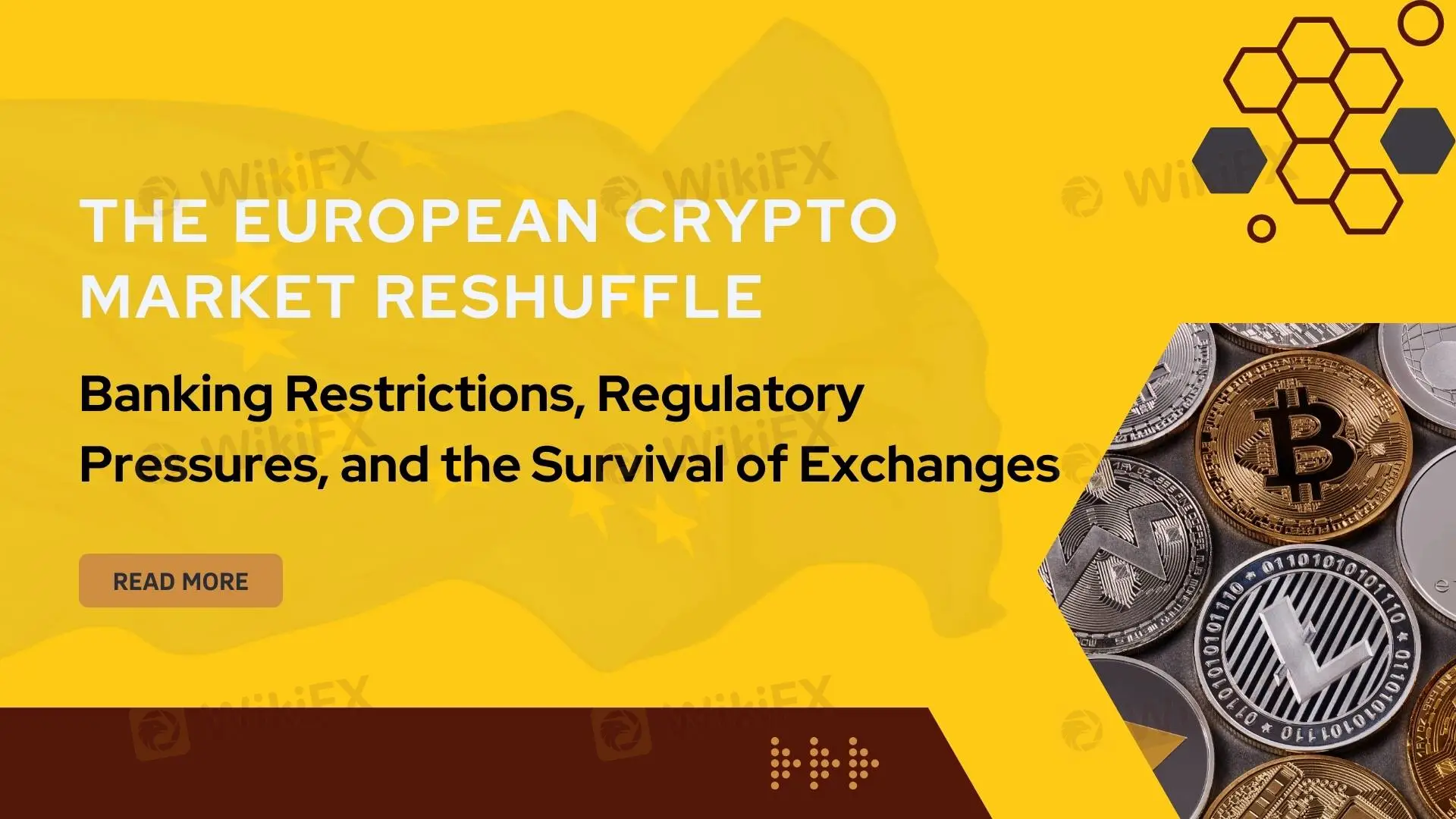简体中文
繁體中文
English
Pусский
日本語
ภาษาไทย
Tiếng Việt
Bahasa Indonesia
Español
हिन्दी
Filippiiniläinen
Français
Deutsch
Português
Türkçe
한국어
العربية
European Crypto Market Shakeup: Banking Limits, Regulatory Pressures, and Exchange Survival
Abstract:Portugal’s BiG bank blocks fiat transfers to crypto platforms. European crypto platforms face mounting challenges amid regulatory changes.

One of Portugal‘s leading banks, Investimentos Globais (BiG), recently announced it will block customers from transferring fiat currencies to cryptocurrency platforms. In its statement, BiG explained that this decision aligns with regulatory guidelines issued by the European Central Bank (ECB), the European Banking Authority (EBA), and the Portuguese Central Bank regarding the risks associated with digital assets. The policy also aims to ensure compliance with the country’s Anti-Money Laundering (AML) and Countering the Financing of Terrorism (CFT) laws.
This decision has garnered significant attention, not only because BiG is a key financial institution in Portugal managing €7 billion in assets but also due to its implications for the crypto industry. While other banks, such as Caixa Geral de Depósitos, still permit fiat transfers to crypto platforms, BiGs policy reflects the increasing regulatory pressure on the digital asset sector.
Attitudes of European Governments, Banks, and Exchanges
1.Government Regulatory Upgrades
In recent years, European governments and regulators have adopted a stricter stance on digital assets. The introduction of MiCAR (Markets in Crypto-Assets Regulation) established a unified regulatory framework for the European crypto market, aimed at enhancing investor protection, combating money laundering, and promoting market transparency. This regulation raises the compliance bar for Crypto Asset Service Providers (CASPs) and mandates strict monitoring of funds related to digital assets by banks.
2.Banks Risk Mitigation
For banks, cryptocurrency‘s volatility and its potential association with risks like money laundering and illicit financing are significant reasons to restrict transactions. BiG’s policy likely reflects compliance pressures and concerns about regulatory penalties. In contrast, banks such as Caixa Geral de Depósitos have yet to adopt similar measures, highlighting the differing stances among European banks on crypto-related activities.
3.Exchanges Responses
Crypto exchanges responses to regulation vary depending on their size and market strategy. Larger exchanges, such as Coinbase and Kraken, tend to embrace compliance, viewing new regulations as an opportunity to expand market share. In contrast, smaller or non-compliant exchanges face survival challenges, with some forced to exit the market.
Crypto Platforms Reacting to European Regulations
The evolving regulatory environment in Europe has prompted many exchanges to adapt their strategies to comply with MiCAR requirements:
- Binance: Announced its exit from several European markets, including the Netherlands and Austria, partly due to failing to secure local regulatory approval.
- Bybit: Plans to cease services for French users in early 2025, citing the high cost of regulatory compliance.
- OKX: Suspended certain stablecoin pairs, such as USDT, in the European Economic Area (EEA) to comply with upcoming MiCAR mandates.
- Coinbase: Limited services for stablecoins that do not meet MiCAR requirements and ended its USDC rewards program in the EEA.
These actions indicate that, while the European market holds significant potential, its complex regulatory environment is prompting some platforms to reassess their strategies in the region.
Disclaimer:
The views in this article only represent the author's personal views, and do not constitute investment advice on this platform. This platform does not guarantee the accuracy, completeness and timeliness of the information in the article, and will not be liable for any loss caused by the use of or reliance on the information in the article.
Read more

Tokenized Stocks: Innovation or Just Another Wrapper?
While tokenized stocks promise global, round-the-clock trading, many platforms only offer synthetic exposure similar to CFDs. Without shareholder rights or deep liquidity, their added value remains in question.

Webull Resumes Crypto Trading, Eyes Global Expansion Starting with Brazil
Webull re-enters the crypto market, launching services in Brazil with a Coinbase partnership. Plans for US rollout signal broader industry trends and renewed digital asset access for users.

Nobitex Hack Exposes $100 Million Loss, Users Fully Compensated
Iran’s Nobitex lost nearly $100 million in a cyberattack using vanity addresses. Funds were burned, not stolen for profit. The platform says user losses will be fully covered.

From Wall Street to Web3: Coinbase and Others Eye Stock Tokenization
Coinbase is reportedly seeking regulatory approval to launch blockchain-based equities—digital tokens representing shares in public companies. As global exchanges experiment with tokenized stocks, a new wave of innovation is poised to reshape both crypto and traditional finance.
WikiFX Broker
Latest News
Manual vs. Automated Forex Trading: Which One Should You Choose?
Scammed by a Click: He Lost RM300,000 in a Month
Revealing Factors That Help Determine the Gold Price in India
Why Regulatory Compliance Is the Secret Ingredient to Trustworthy Forex Brokers
How Are Trade Policies Affecting the Aluminum Market?
US Government Interest Grows in Victory Metals’ Rare Earths Supply
RM71,000 Lost in a Share Scheme That Never Existed
Pentagon to become largest shareholder in rare earth miner MP Materials; shares surge 40%
Delta shares jump 13% after airline reinstates 2025 profit outlook as CEO says bookings stabilized
Delta shares jump 12% after airline reinstates 2025 profit outlook as CEO says bookings stabilized
Currency Calculator


